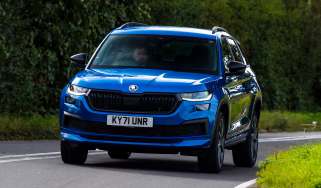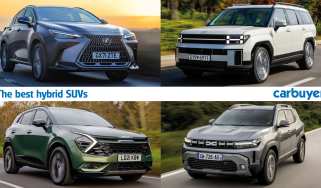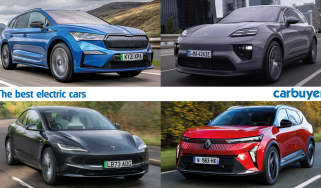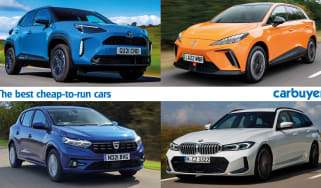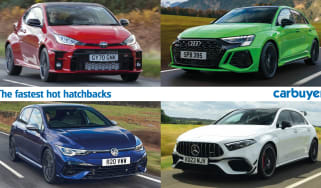What car should I buy? How to decide
With dozens of brands and hundreds of models available, choosing a car can be a lengthy process. Our guide is a great place to start

If you’re thinking about buying a car, it can be daunting to weigh up all the options and know how to decide which one to buy. Knowing how to choose a car is really all down to what you’ll be using it for and how much you’re willing to spend – whether you have nailed it down to a certain bodystyle or still need to work out which is the best type of car to buy, you’ll need to consider a few factors before knowing if it will fit in with your lifestyle and budget.
 Questions to ask when buying a used car
Questions to ask when buying a used car
Although some may find choosing a car a daunting prospect, others look forward to the car-buying process, but it can be easy to get carried away and it’s important to stay grounded while you’re looking. As tempting as it is to go for the model that catches your eye with a fancy colour, attractive looks or a prestigious badge, it can pay off in the long run if you approach the buying process systematically – that’s where we at Carbuyer are here to help.
We’ve put together this guide to help you decide what car you should buy – our team of motoring journalist experts are an important source of information, and it’s also worth making use of helpful resources such as our Best Cars articles and annual Best Car Awards results, along with our Driver Power customer satisfaction survey to get an idea of what real owners think of their cars.
Ultimately only you know your lifestyle, tastes and budget as these factors are unique to each buyer. This guide will help you work out what you need a car for, and put together a checklist for the best option. We’ve also put together in-depth articles on car insurance, road tax, warranties and more, so be sure to have a look if you’d like to know more.
Things to consider when buying your next car
- How much you want to spend - both on buying the car and the subsequent running costs
- What you’ll use the car for
- How much space you need
- What features you need or want
- Whether it should be petrol, diesel, hybrid or electric
New or used?
Deciding to buy new or used is the first step towards buying your next car. Your budget is likely to play a big part in your decision, but it’s worth remembering that both methods have their merits. Buying new means you’ll benefit from the peace of mind of a manufacturer’s warranty, which should last for at least three years. You’ll also get to specify your car exactly to your tastes and needs, but a new car may have a long lead time, and remember that you’re almost always likely to lose more money in the long run than if you bought used, due to depreciation. If you’re thinking of buying new, our guide to the slowest depreciating cars is worth a look.
Used cars, meanwhile, have their own benefits. A used car will almost always be cheaper than its new equivalent and its first owner is likely to have taken the initial hit of depreciation so you don’t have to. A good place to start your used-car hunt is on an ‘approved’ used forecourt, where cars come with added backup from manufacturers - such as a rigorous pre-sale inspection by specialist technicians. You’ll find many of these in one place on our sister site BuyaCar.
Keep reading for more information on the ways to buy a car, the associated running costs you need to consider and what you can expect from a car dealer.
How will you be using the car?
Think about the types of journeys you tend to do. If you’re predominantly going to be nipping around town, fuel economy might be a secondary concern (few cars are at their most efficient in stop-start traffic) but you might want a small car to make parking easier. Four-wheel drive, meanwhile, is usually unnecessary unless you’re planning to tow regularly or you live off the beaten track.
In a similar vein, how much space do you need? Do you need seven seats, or would a cheaper five-seat model suffice? Is there room for your family or friends in the back of the car, and is the boot big enough for the things you tend to carry? Would a higher ride height make it easier to get in and out? If you have bikes or canoes, would roof rails come in handy? Asking yourself questions like these narrows down your search criteria and helps make sure you’re getting a car that suits your requirements.
Decide on a bodystyle
If you were buying a car two or three decades ago, this choice was simple; if you didn’t cover that many miles you bought a hatchback, an estate was for those who needed to carry large loads regularly, while everyone else drove a saloon.
Today, SUVs are a lot more popular, thanks to their higher driving position and increased interior space – more modern offerings drive reasonably well and don’t use much more fuel than a conventional car. You may have also heard of the term ‘crossover’ – this was originally a term to refer to a car blending characteristics of two body styles, but is now used predominantly to refer to cars based on traditional small hatchbacks with the raised ride height or styling features of SUVs. It’s even possible to buy a soft-top SUV, such as the Volkswagen T-Roc Cabriolet, although that particular model is hard to recommend.
These are the body styles we tend to use on Carbuyer:
- City cars (eg. Fiat 500)
- Superminis (eg. Ford Fiesta)
- Small SUVs (eg. Nissan Juke)
- Family hatchbacks (eg. Ford Focus)
- Family SUVs (eg. Nissan Qashqai)
- Large family cars (eg. Ford Mondeo)
- Estate cars (eg. Skoda Octavia Estate)
- Large SUVs (eg. Kia Sorento)
- MPVs (eg. Ford Galaxy)
- Executive cars (eg. BMW 3 Series)
- Coupes (eg. Audi TT)
- Convertibles, sometimes called Cabriolets (eg. Mazda MX-5)
When you’re deciding what car to buy, keep in mind roughly what size and shape of car you want, but be prepared to broaden your search in terms of size and body style. If you’re after a traditional hatchback like the Volkswagen Golf, for instance, would the extra space available in a similarly priced Skoda Karoq SUV be useful, or is all that extra room just going to go to waste?
It’s a similar story with brands: be prepared to consider manufacturers you might once have thought of as too luxurious, as well as brands which might previously have been dismissed for seeming too ‘budget’.
Whichever kind of car you’re in the market for, our series of articles detailing the Best Cars you can buy breaks them down according to body style, while also featuring recommendations based on what you’re going to need the car for – be it towing, avoiding the London Ultra Low Emission Zone, and more.
Petrol, diesel, hybrid or electric?
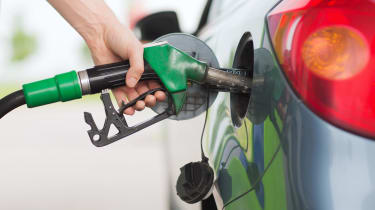
The next thing to consider is what fuels your car. While some cars are only available with a petrol engine, such as the Skoda Fabia, most manufacturers offer both petrol and diesel engines. Mild-hybrid, hybrid, plug-in hybrid and electric models are becoming increasingly common and can be an excellent choice, particularly if you do a lot of driving around town.
As a rule of thumb, if you cover fewer than 12,000 miles a year, a diesel engine may not be suitable. Diesel cars cost more to buy than their petrol counterparts, and you’ll need to cover quite a lot of miles to make up the difference in fuel savings. Conversely, most petrol-hybrid and plug-in hybrid models offer lower running costs than their petrol-only counterparts, but are more expensive to buy than a conventional petrol or diesel model.
You should also consider the type of journeys you’ll be doing in the car. If you mainly do short trips, a diesel is probably not for you, as diesel engines need to be run at speed regularly to burn off soot that collects in the Diesel Particulate Filter (DPF). If you don’t give a diesel engine the chance to do this from time to time, you could find yourself with a blocked DPF and a big repair bill. Our dedicated guide to choosing between petrol and diesel has more information. If you want better economy and lower emissions, then a diesel with mild-hybrid assistance could be a good choice.
If you plan to use your car for shorter journeys, then one of the best plug-in hybrid models could be a viable choice if you have access to a charging point. A large number of PHEV models, such as the BMW 330e and Mercedes A 250 e, can be driven on electric power for around 30 miles, depending on how you drive them, a range that can often be sufficient to cover shorter commutes.
Electric cars offer the lowest running costs (there’s no tax to pay and charging at home costs much less than a tank of fuel) so you can offset the higher purchase price of an EV with much cheaper running costs than you’re probably used to. There are now a wide range of electric cars on the market, with plenty managing over 200 miles between charges - much more than most people ever drive in one go. You can also save on the purchase cost of many electric cars under the pricing cap with the government’s plug-in car grant. Read our guide to the best electric cars for the top 10 models available now.
Work out what's essential
If you’ve got a rough idea of the size and shape of car that you’re after, think carefully about what you use it for. If you have small children, a crossover SUV is a good bet, as the raised ride height makes getting kids and their seats into the car much easier. If you’re keen on DIY, carrying capacity may be important – but look out for cars that have easy-to-fold rear seats that lie flat when dropped. This is something we’ll always point out in our reviews.
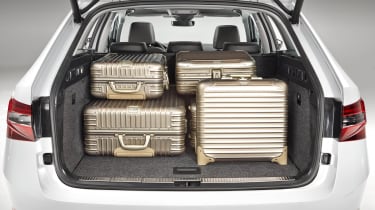
If you need your car to have certain features, such as sat-nav, parking sensors or leather seats, try to go for a trim level that includes them all together, as this is usually better value than adding items individually as options. Specifying a new car’s options can be a tricky business; use our guide to car options for some help.
Each Carbuyer review contains details of every version of a car that you can buy, including engine choices and trim levels. It also includes technical information such as power and performance figures, as well as fuel economy and CO2 emissions data. We also list useful information about boot space, road tax bands and each trim’s standard equipment, so whether you prioritise performance, economy, technology or a combination of all three, our in-depth reviews will give you all the information you need at your fingertips.
Types of finance deals
With the vast majority of new cars bought using some form of finance, and with dealers encouraged to sell cars via this method, cash is not necessarily king, and you’re as likely to get a discount or deal by buying a car on finance.
We’ve put together a comprehensive guide to buying a car using finance, as well as specific guides to PCP deals, Hire Purchase agreements and Personal Contract Hire (leasing). If you’re using one of these methods to pay for a car, keep an eye on the total price as well as the monthly repayments; an optional extra may not seem that expensive on a monthly basis, but it’s easy to lose sight of the true cost of options, and you may not get your money back when it’s time to sell your car or trade it in.
Taking out a GAP insurance policy when buying via finance is also a good idea as, if you’re unlucky enough to write off your car, you could find yourself seriously out of pocket, adding insult to injury.
What are the running costs?
It’s tempting to stretch yourself as far as you can when setting a budget for a new car, and monthly repayments can be tantalisingly low – even for upmarket models. Be sure to bear in mind, however, that running costs are easily dismissed at the buying stage, and excessive fuel consumption or insurance premiums could leave you resenting your car.
With brand new cars, the first year’s VED payment (road tax) is included in the car’s price, and then you’ll pay a flat rate from the second year onwards. The current rates (as of April 2022) are £165 a year for a petrol or diesel car and £155 a year for mild-hybrids, hybrids and plug-in hybrids. Electric and hydrogen cars cost nothing in tax. Cars registered before April 2017 were subject to a different tax structure, which took CO2 emissions and engine size into account - so you may pay much less or much more, depending on the car.
As of 2017, an additional surcharge for every car costing more than £40,000 (including any optional extras) was introduced. The surcharge is currently £335, which needs to be paid every year for the first five years after first registration. After the five year period ends, annual road tax returns to the flat rates mentioned above. Zero-emission cars are exempt from this extra surcharge, so even the most expensive EVs are free to tax.
If you’re a company-car driver, CO2 emissions will also affect how much Benefit-in-Kind (BiK) tax you pay, so be sure to take this into consideration too.
Fuel economy obviously needs to be taken into account. While manufacturers’ official figures have previously been hard to match in the real world, the introduction of the new 'WLTP' economy and emissions testing in 2017 means they are now more accurate. You should still take quoted figures with a pinch of salt because how and where you drive will affect fuel economy.
Keep an eye on the trip computer during any test drive for a more realistic economy figure, and ask the dealer to show you how to access this information if you’re unsure. If economy is important to you, our guide to the most economical cars on sale today is well worth reading.
Don’t forget to get some insurance quotes for any car you’re thinking of buying, as some models can cost significantly more to insure than others. If you’re a young driver, it may be worth looking at a ‘black box’ insurance policy, and our guide to the best first cars.
Make a shortlist of cars and test-drive them
If you know what engine and specification you want your car to have, try to test a model that’s as similar as possible. This is well worth doing; while it may mean you’ll have to wait for the dealer to get the right car delivered, different engine and gearbox combinations can completely alter the way a car drives, as can options like sports suspension and large alloy wheels. If you’re after sat-nav or in-car tech features like Bluetooth phone connectivity, check how well these work, as some systems are far superior to others. Luckily, most cars come with Apple CarPlay and Android Auto, so you can use your phone’s navigation and media apps on the screen instead of the car’s system.
If you’re buying a car for the family, take your partner and children along with you to see how they like the car. They may spot problems that you hadn’t considered, such as poor interior storage space or uncomfortable rear seats. It’s also a good idea to bring along any bulky items – such as children’s buggies or golf clubs – that you regularly carry, to see how well these fit in the boot.
On the test drive, be sure to drive along a variety of roads, from dual carriageways to twisty back roads. This will help you make a fuller assessment of the way the car handles. Some dealers may let you borrow a car over the weekend, and this can be helpful – though make sure you don’t become too attached to it, as maintaining a clear, objective approach is key. Our in-depth guide to test drives has more information.
The key focus of any test drive, obviously, is the car itself – so don’t let the salesperson distract you with small talk too much – though it pays to be polite if you want to strike a good deal! Speaking of which…
Get haggling
Once you’ve decided on which car to buy, it’s time to agree on a price. Some dealers are more open to haggling than others, but do phone round their competitors to see what offers are available elsewhere, and don’t be afraid to share this information with the salesperson; they want your business, after all. Our guide on negotiating a great price for your new car has more information.
If the car you’re after is a particularly new or in-demand model, discounts are likely to be rare. You should be able to get a set of car mats and a full tank of fuel thrown in, though.
Unless you’re buying an older second-hand car, you should also expect some kind of warranty, and aftermarket policies can offer extra peace of mind – though be sure to check what is and isn’t covered. Used cars that are between one and three years old can offer serious savings together with some remaining manufacturer’s warranty, while pre-registered cars offer something of a halfway house between the new and used market.
If you’re trading in an old car as part of the buying process, do your research and find out how to value your used car before you go shopping for a new car to be sure the dealer gives you a fair price.
Deciding which car to buy is an involved process, and many people try to get behind the wheel as soon as possible. Bear in mind, though, that time invested in finding the right car should pay dividends during the time you own it. Happy hunting!
If you’re still stuck, contact us at hello@carbuyer.co.uk and we’ll give our expert advice.
Once you've bought your new car, you'll want to know how to look after it, read our basic car maintenance tips every motorist should know...
Recommended
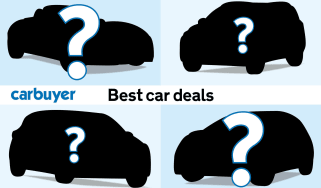
Best new car deals 2024: this week’s top car offers
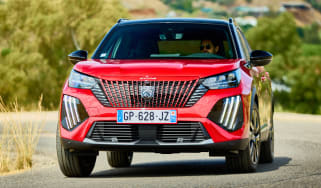
Peugeot EV customers benefit from new 8-year, 100k-mile warranty
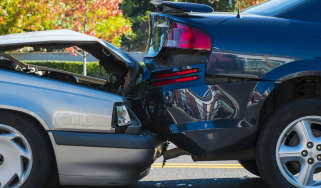
Cat S and Cat N cars explained: guide to buying an insurance write-off
Most Popular

Best new car deals 2024: this week’s top car offers

Cat S and Cat N cars explained: guide to buying an insurance write-off
Tips & advice



